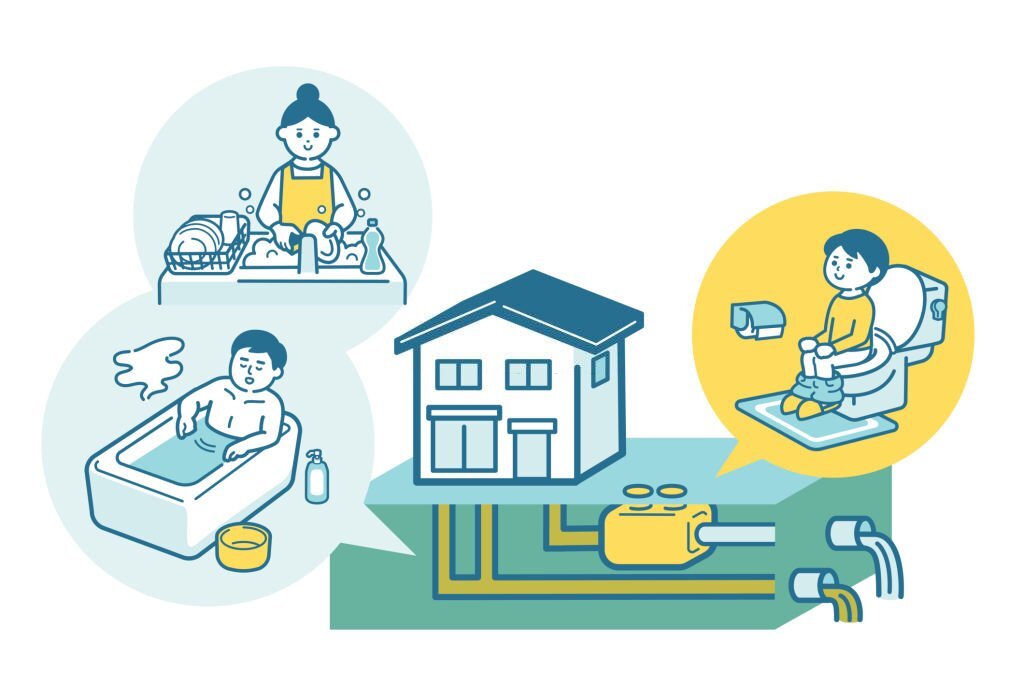Water is an essential resource for all living beings. With the increasing population and industrialization, the water demand is continuously increasing. However, with this, the problem of water scarcity and pollution has also become more acute. One solution to these problems is using water treatment plants to treat and recycle wastewater for reuse. This blog post will discuss how to make the most of a greywater treatment plant.

What is Greywater Recycling?
Greywater recycling is reusing wastewater from household activities such as washing clothes, dishes, and showering. It differs from blackwater, which is wastewater from toilets and kitchen sinks and requires a more advanced treatment process. Greywater is relatively less polluted than blackwater, and after treatment, it can be used for irrigation and other non-potable uses.
What is the Link Between Water Reuse and Water Neutrality?
Water reuse and water neutrality are interconnected concepts. Water neutrality means using water sustainably so that the amount used does not exceed the amount of water that can be replenished naturally. Water reuse is one way of achieving water neutrality because it reduces the demand for freshwater, reducing the strain on water resources. A greywater treatment plant is effective for achieving water neutrality because it can treat and reuse wastewater, reducing the demand for freshwater.
Difference Between Greywater and Blackwater
Here is a comparison chart showing the difference between greywater and blackwater:
|
Parameters |
Greywater |
Blackwater |
| Source | Household activities such as showering, washing dishes, and clothes | Toilets |
| Treatment required | Basic treatments such as filtration and disinfection | Advanced treatments such as anaerobic digestion and chemical treatment |
| Pollutants | Less polluted than blackwater | More polluted than greywater |
| Reuse potential | It can be reused for irrigation and other non-potable uses | Requires additional treatment for reuse |
Primary Greywater Treatment Guidelines
Now, let’s discuss some basic guidelines for making the most of a greywater treatment plant:
- Separate greywater from blackwater: To ensure effective treatment, it is important to separate greywater from blackwater. This can be done by installing separate drainage systems for greywater and blackwater.
- Install a basic treatment system: A basic greywater treatment typically includes filtration and disinfection. The filtration process removes solid particles from the water, while disinfection kills harmful bacteria and viruses. This treated water can then be used for irrigation and other non-potable uses.
- Use appropriate cleaning products: Using harsh chemicals and detergents can harm the environment and reduce the effectiveness of the treatment process. It is essential to use eco-friendly cleaning products that are safe for the environment and do not contain harmful chemicals.
- Regular maintenance: Regular maintenance is crucial for the effective functioning of a greywater treatment plant. This includes cleaning filters and checking pumps and valves.
- Monitor water quality: It is important to regularly monitor the quality of the treated water to ensure that it meets the required standards for reuse. This can be done by conducting regular water quality tests.
Reuse of Greywater
How to Reuse Grey Water From the Washing Machine
Washing machines can consume a significant amount of water in a household. However, the water used for washing clothes can be reused for non-potable purposes. To reuse the washing machine’s grey water, connect a hose to the washing machine’s drainage pipe and direct it to a greywater treatment plant. The treated water can be used for irrigation, flushing toilets, or other non-potable uses.
How to Reuse Grey Water From the Shower
Showering is another activity that generates a significant amount of grey water. Grey water from showers can be reused for non-potable purposes such as irrigation, flushing toilets, or washing cars. To reuse grey water from the shower, you can install a greywater diverter that directs the water to a greywater treatment plant. Alternatively, you can collect the water in a bucket and manually transfer it to the treatment plant.
How to Reuse Grey Water From the Sink
Grey water from sinks can also be reused for non-potable purposes. However, it is important to note that the water from kitchen sinks may contain more pollutants than water from bathroom sinks. You can install a diverter that directs the water to a treatment plant to reuse grey water from sinks. Alternatively, you can use the manual transfer process.
Using Greywater to Irrigate Home Gardens
Greywater is an excellent water source for home gardens. Using greywater to irrigate your plants can significantly reduce the demand for freshwater and make the most of a greywater treatment plant. Here are some benefits of using greywater to irrigate your garden:
Greywater Helps Plants Thrive
Greywater is rich in nutrients that are beneficial for plants. When you use the water to irrigate your garden, you provide your plants with an additional source of nutrients, which can help them grow and thrive. This is especially important in regions where freshwater is scarce and the soil is poor in nutrients.
Your Garden Can Be a Natural Water Treatment Plant
When you use greywater for irrigation, your garden becomes a natural water treatment plant. As the water filters through the soil, it is purified by the plants and microorganisms in the soil. This process helps to remove pollutants and other contaminants from the water, making it safer for the environment.
Greywater Gardening Can Save Water in the Long Run
Using greywater for your home garden reduces the amount of freshwater you need for irrigation. This can save significant water in the long run, especially in regions with scarce or expensive freshwater. Additionally, by reducing the demand for freshwater, you are helping to preserve this precious resource for future generations.
How to Use Greywater to Irrigate Your Garden
To irrigate your home garden, you need to follow some basic guidelines to ensure the safety and effectiveness of the process.
Use Appropriate Cleaning Products
When using greywater to irrigate your garden, it is important to use safe cleaning products for plants and the environment. Avoid using cleaning products that contain bleach, borax, or sodium peroxide, as these can harm plants and soil microorganisms.
Install a Greywater Treatment Plant
To ensure the safety of the greywater used for irrigation. It is important to install a greywater treatment plant. The system will help to remove contaminants and pollutants from the water, making it safer for plants and the environment. Different types of systems are available, such as sand filters, constructed wetlands, and membrane bioreactors. Consult a water treatment solutions provider to determine the best option for your needs.
Avoid Contact with Edible Parts of Plants
When using greywater to irrigate your home garden, avoiding contact with the edible parts of plants is important. Greywater may contain harmful bacteria and pathogens that can cause illness if ingested. To avoid contact, water your plants at the base and avoid spraying water onto the leaves or fruit of the plant.
Monitor Water Quality
To ensure the safety and effectiveness of using greywater for irrigation. It is important to monitor the quality of the water regularly. Test the water for pH, total dissolved solids, and pathogens to ensure it is safe for plants and the environment. If you notice any changes in the water quality, consult a water treatment solutions provider to address the issue.
Top Myths & Facts About Greywater and Greywater Treatment Plants
Myth #1: Greywater is Always Safe for Plants
Fact: While greywater is generally safe for plants, it can contain harmful chemicals and pathogens that can harm plants. Using appropriate cleaning products and installing a greywater treatment system is essential to remove contaminants and pollutants from the water.
Myth #2: Wastewater Treatment Plants are Expensive
Fact: Greywater treatment plants are cost-effective in the long run, as they can significantly reduce the demand for freshwater and lower water bills. Additionally, different types of greywater systems are available, ranging from simple systems that homeowners can install to more advanced systems that water treatment solutions providers can install.
Myth #3: Greywater Treatment Plants are Difficult to Maintain
Fact: They are relatively easy to maintain, especially if designed and installed correctly. It is essential to focus on regular maintenance tasks, including cleaning filters, monitoring water quality, and inspecting the system for any damage or leaks.
Myth #4: Greywater Treatment Plants are Illegal
Fact: wastewater systems are legal in many countries, including India and the US, as long as they meet certain requirements and regulations. It is important to consult local authorities and water treatment companies to determine the legality of greywater treatment plants in your area.
Myth #5: Greywater Treatment Systems are Only Suitable for Warm Climates
Fact: These plants can be used in all climates, including cold climates. In colder climates, additional measures, such as insulating pipes and tanks, may be taken to prevent freezing.
Myth #6: Greywater Treatment Plants are Only Suitable for Residential Properties
Fact: They can be used in various settings, including commercial properties, schools, and public parks. In fact, using them in commercial settings can result in significant water savings and lower operating costs.
Myth #7: Greywater Treatment Plants Can Replace Sewage Treatment Plants
Fact: While wastewater treatment systems can significantly reduce the demand for freshwater and lower water bills, they cannot replace sewage treatment plants. Sewage systems treat wastewater from toilets, showers, and sinks, while greywater plants treat wastewater from non-toilet sources, such as washing machines and sinks.
Myth #8: Greywater Treatment Plants Are Not Effective at Removing Contaminants
Fact: Greywater systems can effectively remove contaminants from greywater, including bacteria, viruses, and chemicals. However, the level of treatment will depend on the type of system and the quality of the greywater input.
Myth #9: Greywater Treatment Systems are Smelly and Unsightly
Fact: Greywater treatment plants can minimize odors and aesthetic impacts with options such as underground tanks and natural landscaping. The benefits of reusing greywater for irrigation and other non-potable uses can outweigh any minor visual or olfactory effects.
Myth #10: Greywater Treatment Plants are Not Worth the Hassle
Fact: While installing and maintaining a greywater treatment system may require some effort and investment upfront, the long-term benefits can be significant. These include reducing freshwater demand, lowering water bills, and potentially increasing property values.
Myth #11: Greywater is Not Safe for Human Contact
Fact: While greywater is unsuitable for drinking, it is generally safe for non-potable uses such as irrigation and toilet flushing. However, precautions should be taken to avoid direct contact with greywater, and it should not be used in areas where people are likely to ingest or inhale it, such as fountains or misting systems.
We can encourage more widespread adoption of this sustainable water management practice by dispelling these myths and educating homeowners on the benefits and proper use of greywater treatment plants.
We Can Provide the Ideal Greywater Treatment Plant for Your Needs
If you’re looking for a sustainable and cost-effective way to manage your household water usage, a greywater treatment plant could be the perfect solution. At Cleantech Water, we provide a wide variety of water treatment solutions for your needs, tailored to your household and local regulations. Here are a few reasons you should consider investing in our greywater treatment solution:
- Customized solutions: Our team will work with you to design and install a greywater treatment plant that meets your unique needs and fits seamlessly into your home and landscape.
- Quality materials and construction: We use only high-quality materials and construction techniques to ensure your plant is durable and effective for years.
- Regulatory compliance: Our team is well-versed in local regulations and can ensure that your greywater treatment plant meets all necessary codes and permits.
- Expert maintenance and support: We offer ongoing maintenance and support for your treatment plant, ensuring that it continues to function optimally and provides maximum water savings.
Don’t hesitate to take the next step in water sustainability for your home. Contact us today to learn more about how a water treatment plant can benefit you and discuss customized household solutions.

